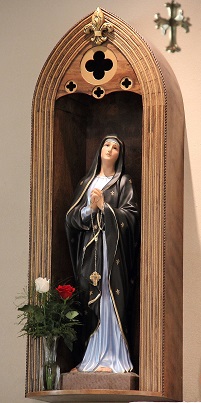Month of September
by VP
Posted on Sunday September 01, 2024 at 12:00AM in Tradition

Our Lady of Sorrows, Sacred Heart, Dunn NC
Devotion for the month of September: Our Lady of Sorrows
"Our Lady, Mother of Sorrows pray for Priests, your special sons. Strengthen their faith and love of Jesus in the Most Blessed Sacrament, so that they may turn to Him for the grace they need to live a life faithful to their calling. Bring comfort, consolation and courage to those who are suffering under the weight of the Cross. Give them the love of your Son and zeal for the honor and glory of God, and the salvation of souls. Amen"
Virtue for the month of September: Prayer
"One of the acts of the virtue of religion. All intelligent creatures are bound to thing about God and to hold converse with Him; in other words, to pray to Him.
Prayer in this wide sense may be defined to be the raising of our minds to God, "ascensus mentis ad Deum." It may be either purely mental or vocal, that is, expressed in language.
The four great acts of prayer are Adoration (the acknowledgment of God's supreme majesty, and our entire dependence upon Him.),Thanksgiving, Petition, and in the event of our having offended Him, Contrition.The third of these, Petition, is so important that the word prayer (precari) conveys this notion alone: and it is of that we shall here chiefly speak.
The objections to prayer arise from two entirely opposite errors, chance, and fate. If all that happens takes place without any kind of power to regulate it, or if everything is governed by rigid law which cannot be controlled, then of course it is useless to pray. But reason and revelation alike tell us that the world is ruled by the Providence of God. We firmly uphold the existence of law in the universe, but at the same time we maintain that God, the author of this law, can counteract, suspend or change it at His pleasure. Thus we pray for rain, fine weather, or health because we believe that God is the Lord of heaven and earth, "Who worketh all things according to the counsel of His will" (Eph. i. 11; Mt. v.45; Acts xiv. 14-16). How God brings about the answers to our prayers cannot be exactly determined. The late W. G. Ward discussed the subject in a pamphlet entitled, "Science, Prayer, Free Will, and miracles."
Prayer, being an act of religion, should be addressed to God. We pray to Him, not because He does not already know our needs, but because He wills that we should ourselves put them before Him and beg Him to grant them. Although our Lord said, "Your Father knoweth that you have need of these things" (Mt. vi. 32), yet He also told us "that we ought always to pray, and not to faint" (Lk. xviii.1). It is God alone Who can give us what we ask for. This, however, does not prevent us from praying to certain of God's creatures. We ask God directly to grant us our petitions; we ask the Blessed Virgin, the angels, and the saints to ask God to grant them, "And the smoke of the incense of the prayers of the saints ascended up before God from the hand of the angels" (Apoc. viii. 4.)
Should we specify our petitions, and, if so, what may we ask for? St. Thomas considers that the opinion of Socrates, that we should merely ask for what is good for us, is only partially true. Some things we know to be certainly good for us, and these we may specify: the Lord's Prayer contains a number of specific petitions. This being granted, the general rule is that laid down by St. Augustine: we may pray for whatever we may lawfully desire. Hence we may ask for even temporal blessings, not indeed for their own sake, but as aids to our spiritual welfare. According to the Apostle we should pray for all men. (1 Tim.ii.). Charity bids us help our neighbor on the road to salvation, and prayer is one of the most potent means of doing so (1 Jn. v. 16; James v. 16; Rom xv.). The order in which we should pray for others follows the order of Charity, and depends upon their nearness to us and their needs. With regard to enemies, we are bound to pray for them in general - not excluding them from the benefit of our prayers. To pray for them specially belongs not to precept but to counsel. (Mt. v. 44.)
It is obvious that as prayer is a thinking about God and speaking with him, it should be performed with great attention and devotion. Merely to utter the words is no prayer. "This people honoreth Me with their lips but their heart is far from Me" (Mt. xv. 7). St. Thomas distinguishes three kinds or degrees of attention: to the words, to the meaning of the words, and to the object of the prayer, that is, to God and what we pray for. It is the last kind that is required. To keep one's attention fixed on an unseen object is difficult, and consequently we are very liable to mind-wandering when we pray. But if our distractions are not wilful - if whenever we recollect ourselves we try once more to fix our attention to God - our prayer is not altogether unfruitful. To be willfully distracted would be sinful. The best plan is to collect our thoughts for a few moments before kneeling down. "Before prayer prepare thy soul, and be not as a man that tempteth God" (Ecclus. xviii. 23)"